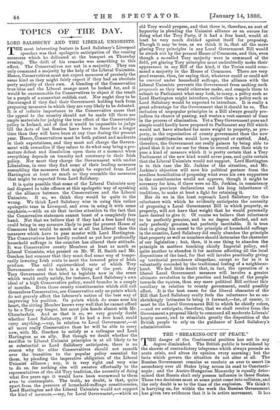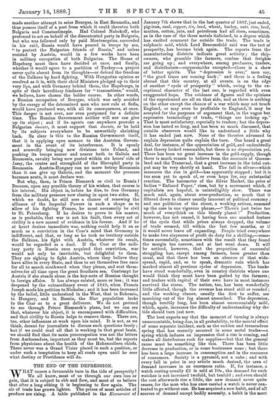THE "BREAKING-OUT OF PEACE."
THE danger of the Continental position has not in any degree diminished. The British public is bewildered by the shower of contradictory telegrams which always precede an acute crisis, and alters its opinion every morning ; but the facts which govern the situation do not alter at all. The Russian Government remains as resolute as ever to assert its ascendancy over all States lying across its road to Constanti- nople; and the Austro-Hungarian Monarchy is equally deter- mined that Russia shall only possess influence in those States. Those two decisions must at some point come into collision, and the only doubt is as to the time of the explosion. We think it is hurrying on, for within the week the Russian Government has given two evidences that it is in active movement. It has made another attempt to seize Bourgas, in East Roumelia, and thus possess itself of a port from which it could threaten both Bulgaria and Constantinople. Had Colonel Nabokoff, who professed to act on behalf of the discontented party in Bulgaria, but who was followed only by paid Montenegrins, succeeded in his raid, Russia would have poured in troops by sea, "to protect the Bulgarian friends of Russia," and unless resisted by Austria, would in a few weeks have been in military occupation of both Bulgarias. The House of Hapsburg must then have decided at once, and finally, whether it would agree to a partition of Turkey—a project never quite absent from its thoughts—or defend the freedom of the Balkans by hard fighting. With Hungarian opinion so resolved as it is, with their chief Ministers pledged up to their very lips, and with Germany behind them, the Hapsburgs, in spite of their hereditary fondness for "transactions," would, we believe, have chosen the bolder course. In other words, a Russian occupation of Bourgas, which was only avoided by the energy of the determined men who now rule at Sofia, would have produced war, with all its consequences, at once. This danger is not over, nor even postponed for a definite time. The Russian Government neither will nor can give up its object ; and if its agents can anywhere provoke a Bulgarian e'meute, it must support that Imeute, or be held by its subjects everywhere to be unworthily shrinking back. Bo clear is this to the Russian Government itself, that it is applying open menace to the Austrian Govern- ment in the event of its interference. It is openly and avowedly bringing new divisions into Poland, and pushing its troops nearer and nearer both to Galicia and Roumania, cavalry being now posted within six hours' ride of Jassy, the centre and stronghold of the Slavophil party in Roumania. Austria-Hungary can no more betray Roumania than it can give up Galicia, and the moment the pressure becomes acute, it must declare war.
But why, then, is Prince Bismarck so civil to Russia? Because, upon any possible theory of his wishes, that course is his interest. His object is, before he dies, to free Germany from the military pressure now closing in upon two sides. If, which we doubt, he still sees a chance of renewing the alliance of the Imperial Powers in such a shape as to allow of his fighting France, he must necessarily be civil to St. Petersburg. If he desires to prove to his master, as is probable, that war is not his fault, then every act of civility is a new morsel of evidence in his favour. And if he at heart desires immediate war, nothing could help it on so much as a conviction in the Czar's mind that Germany is indifferent, and that, so long as he took no territory outside the Balkans, his fight with Austria, whatever its result, would be regarded as a duel. If the Czar or the mili- tary party in Russia once acquired that conviction, war would not only be inevitable, but delightful to them. They are sighing to fight Austria, where they believe they have allies in every State, and thus to set themselves free once for all to march southward when they please, and seat them- selves for all time upon the great Southern sea. Contempt for Austria if she stands alone, is the key-note of Russian thought in foreign affairs. It has always existed, more or less ; it was deepened by the extraordinary event of 1849, when Francis Joseph made his petition to Nicholas ; and it has been increased by the belief, little understood in the West, that in Bohemia, in Hungary, and in Bosnia, the Slav population looks to the Czar as to a great deliverer. We do not pretend to see through Prince Bismarck's plans, but we can see that, whatever his object, it is encompassed with difficulties, and that civility to Russia helps to remove them. There are, too, other influences at work upon his mind. It is not, as we think, decent for journalists to discuss such questions freely ; but if we could read all that is working in that great brain, we should find that its main preoccupation was not the letters from Ambassadors, important as they must be, but the reports from physicians about the health of the Hohenzollern chiefs.
There never was a Grand Vizier placed in such a position, or under such a temptation to keep all roads open until he sees what destiny or Providence will do.







































 Previous page
Previous page